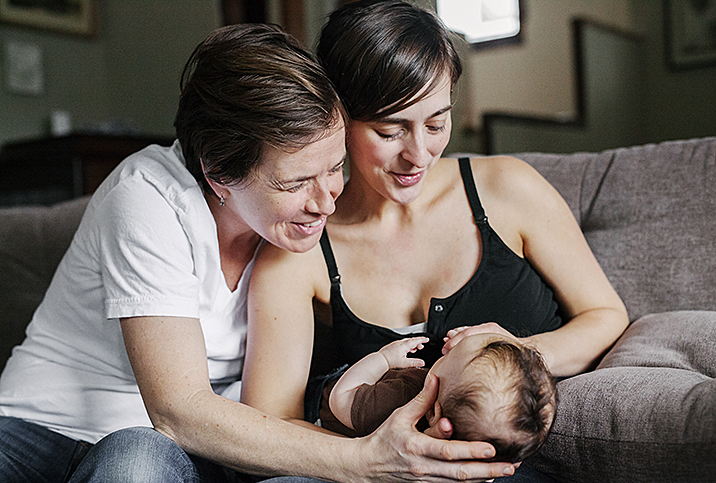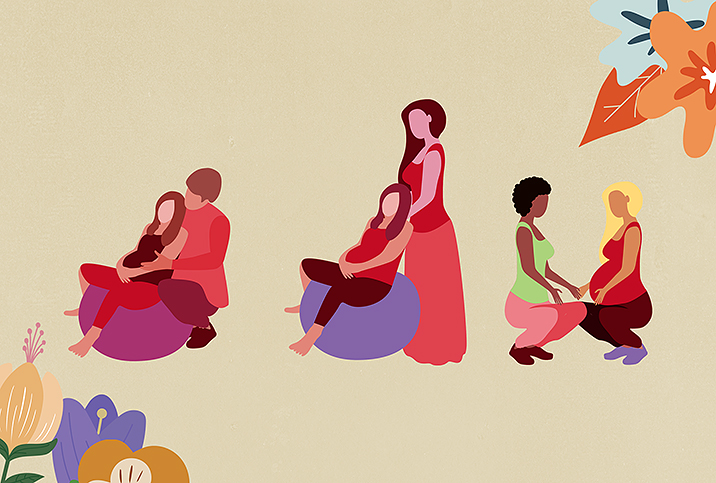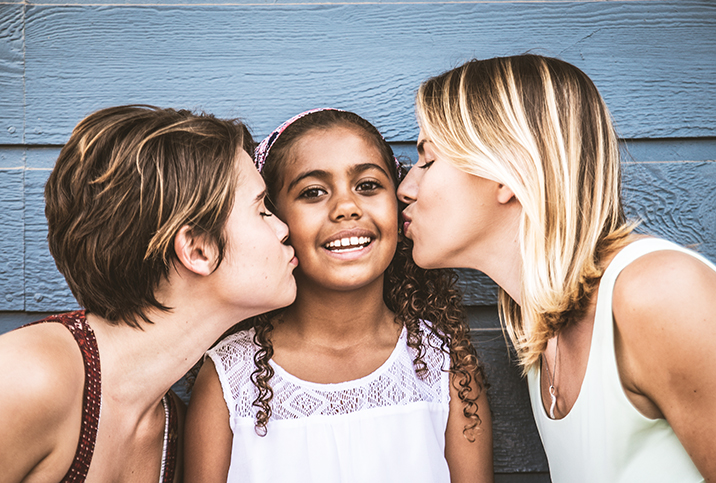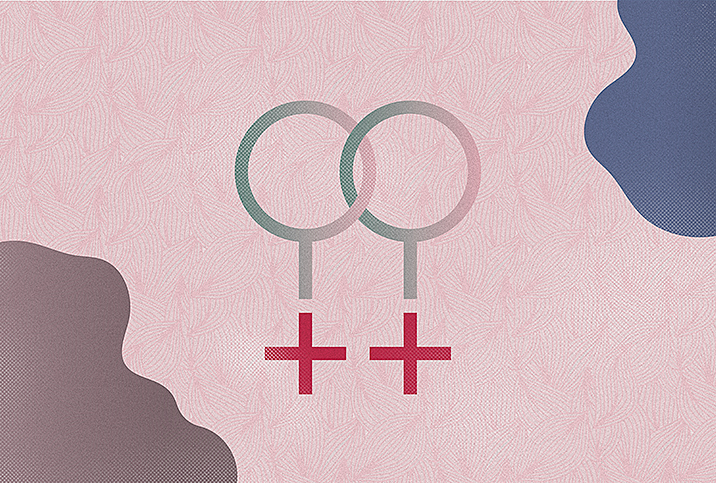How Queer Parents Navigate Fertility

"We can't wait to meet our son," said Nicole, a 33-year-old from New Hampshire who is having a child with her wife of eight years. After bonding over the mutual desire to have children and raising their nieces and nephews, the two decided to try having kids of their own. Carolann, Nicole's wife, said, "But being a lesbian couple, trying to plan a family is extremely frustrating."
Prospective queer families often must navigate extra challenges to have children, including biased health insurance regulations, the lack of nationwide nondiscrimination protections, outdated understandings of infertility, and the high cost of adoption, foster care and assisted reproductive technology, according to a 2018 report from the LGBTQ Family Building Survey.
A year after deciding to try for children, Nicole and Carolann hit a major roadblock. Carolann, who'd always wanted to carry her own children, was diagnosed with cancer and needed a full hysterectomy. Nicole, who wanted to honor her wife's wishes, agreed to carry their child, who was to be conceived through intrauterine insemination (IUI), a fertility treatment that involves inseminating the uterus through the use of a catheter.
Despite the two women's financial, marital and legal commitment to each other and their child, Carolann will have no legal parental rights to her son. In the U.S., legal parent status is automatically given to a parent with a biological relation to a child, but not necessarily to the nongenetic co-parent, according to the Human Rights Campaign.
"My baby won't be my baby until I adopt him. Even if I sign the birth certificate, I'm not considered his parent," Carolann said. The couple will have to undergo second-parent adoption, a legal process available in their home state of New Hampshire but not nationwide. "It'll be expensive," Carolann said. A second-parent adoption can cost up to $3,000 in legal fees and home study expenses.
It's not just adoption practices that control queer people's access to parenthood. Insurance policies play a huge role and drastically affect the costs of family planning. According to the LGBTQ Family Building Survey, most health insurance plans refuse to cover the cost of fertility treatments, and when they do, both heterosexual and queer couples must "prove" they've been trying to conceive for 6 to 12 months before coverage starts.
This policy may appear neutral, and even logical, but when applied to queer couples, proving infertility has a discriminatory effect. How can a queer couple with anatomy not compatible for reproduction "prove" they've been trying to conceive? The only realistic way is to pay for fertility treatment up-front without coverage. Considering the average cost of IVF ($13,500 to $21,000 per attempt) or IUI ($500 to $4,000 per attempt), the policy proves to be an impossible financial barrier for many queer families.
Even if couples can access inclusive insurance or have family-friendly employers, the LGBTQ Family Building Survey states, "These are the exceptions rather than the rule."
As a lesbian couple in Brooklyn, Jen, 39, and her wife often rubbed up against a system not built for them. While trying to conceive through IUI, Jen noticed a huge disconnect between the medical and fertility industries—one that often had to be filled by prospective parents undergoing medical procedures, taking hormone-laced medications, tracking ovulation or all of the above.
"It's like being both the client and the lawyer—advocating for yourself while going through the experience can be difficult to handle emotionally," Jen said. "We had to track ovulation with our endocrinologist, which included coming in for blood tests, coordinating booster shots and scheduling IUI procedures. At the same time, I was expected to coordinate getting the donor sperm to my doctor's office because the cryobank and my doctor would not communicate with each other."
Another, more covert barrier for LGBTQ families is a chilly reception at the doctor's office—whether intentional or grounded in heteronormative conditioning.
Jen, who like Carolann had ongoing medical issues, knew that pregnancy may not be a viable option. She met with a maternal-fetal medicine doctor to discuss her possible high-risk pregnancy. The doctor casually suggested Jen's wife should just carry the baby.
"In that one moment, the doctor completely dismissed my agency and any other reasons we were asking about me and not my wife," Jen said. "I can't imagine a doctor telling a straight woman to simply find another uterus." That interaction, coupled with the mounting paperwork geared only toward "husbands and wives," left a bitter taste in Jen's mouth.
To close the gap between heteronormative care and her queer experience, Nicole turned to LGBTQ parenting forums, Facebook groups and fertility tracking apps like Mira. Other queer parents who'd been through the process offered support, legal tips and a boost of encouragement. Seeing so many other lesbian mothers and queer parents buoyed Nicole and Carolann.
For Jen, she and her wife spoke directly with doctors and fertility care providers about updating their intake forms and paperwork to be more queer-inclusive and gender-neutral. For Jen, small changes can have a significant impact on how welcome she feels. Other small but impactful interventions that support LGBTQ fertility patients include providing information tailored to LGBTQ populations and gender-neutral language, according to one 2020 study published in the academic journal Fertility and Sterility.
If more support is needed, doulas are a critical resource for queer folks, as they can provide ongoing support throughout the fertility and birthing process, provide pertinent information and advocate for their patients on a deeper, long-term level. There are even queer-only doula services, like the Queer Doula Network. "My biggest advice to other parents is to just not give up," said Carolann.
With persistence, Jen and her wife welcomed their son, Lloyd, into their lives, while Nicole and Carolann are expecting their son, Grayson, this fall.
"We're so excited to meet Grayson," Nicole said. "I can't wait to just experience life with him."


















